
|
Today's Calendar |
| | Simply Economics |
| | International Perspective |
| | Resource Center |
 |
|
| 1999 Articles |
|
International Perspectives - September 27, 1999
Spotlight on the yen... As the markets nervously waited for the outcome of the Group of Seven meeting, the Bank of Japan's Monetary Policy Committee met on Tuesday. The Bank of Japan's Monetary Policy Committee met last Tuesday and after eight hours of discussion decided to leave monetary policy unchanged. The financial markets were disappointed when the Bank did not take action to stem the rise of the yen. The matter is more complex than even the currency markets would allow. The Bank of Japan only recently won independence (April 1998) from the Ministry of Finance. The Bank is fiercely protective of this newly won independence and would not capitulate to the Ministry of Finance's pressure to change its policy towards foreign exchange intervention. The Ministry of Finance wants the Bank to monetarize its intervention in the foreign exchange markets to push down the value of the yen (i.e. more yen per dollar) and at the same time, stimulate the domestic economy by increasing money supply. 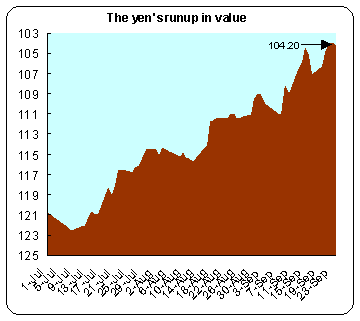 Monetary policy should not change because the Bank, in its opinion, has already supplied adequate funds. Therefore, the Bank has refused, up until now, to allow the excess funds accrued as a result of recent foreign exchange interventions to feed through to domestic demand. This would boost the domestic economy. Instead it has "sterilized" its currency interventions by buying back anything it sold on the domestic market. The Bank of Japan, in its statement after their meeting, also stressed that the foreign exchange market should not be a target of monetary policy. Furthermore, it should not be forced into making a decision because of any build-up in market expectations, as was the case on Tuesday. They would consider, however, international coordination during the annual gathering of the IMF and World Bank. The United States has shown no inclination to help weaken the yen, which would boost the sale of Japanese exports in the United States.
Group of Seven United Kingdom Gold Sales The United Kingdom Treasury resumed gold sales on Tuesday. Twenty five tons from the Treasury's foreign currency reserves were auctioned in London for the second time this year. The Bank of England received $255.75 an ounce for the 25 tons it sold on Tuesday, slightly above the prevailing market price at the time. This, and the fact that the sale was eight times over subscribed, helped boost sentiment for gold. Gold mining companies were among the bidders in Tuesday's auction and analysts saw this as significant. The reason for the gold sales is that the government is planning to reduce its dependence on gold and shift more of its reserves into foreign currencies like dollars, yen and euros, which it says, give a higher return. But critics say that the sales have damaged the interests of gold producers like South Africa, and caused a collapse in the gold price that is counter-productive for the reserves. In July, when the government sold its first tranche of gold, the sale was five times over subscribed. The price of gold fell nearly 10 percent after Britain initially said it planned to sell off more than half of its gold reserves - some 415 tons out of the 715 tons in the vaults. The higher gold price after last week's sale generated strong demand for shares in leading mining companies. Gold's latest rally has also been fuelled by nervousness on world stock markets, with some analysts saying that the drop in the Dow Jones index is helping to underpin support for the metal. 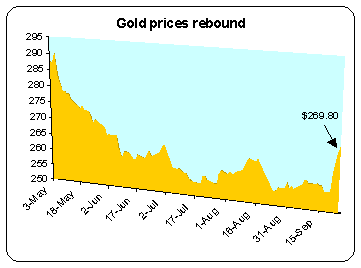 Gold prices closed the week at $269.80, up over five percent on the week, well above the Bank of England's auction price of $255.75. This is the highest price for gold since the end of May. Sentiment contrasted sharply with the reaction to the first Bank of England sale, which sent gold to its lowest level in 20 years - $252.50 an ounce in late August. Other countries are also planning to sell gold, including Argentina and Switzerland. The International Monetary Fund is planning to revalue some of its gold reserves in order to help pay off Third World debt. Planned Swiss central bank sales will probably start in 2001 - a year later than generally expected. The Swiss National Bank said that it was sticking to its plans to sell half its 2,600 tons reserve some time after early 2000.
Indicators emphasize economic recovery...
Europe The UK has also been importing more goods, leading to an increase in the trade gap. The high value of the pound sterling has hit exporters. The current account deficit for the second quarter was the biggest trade gap since 1990, and much bigger than expected. Britain traditionally imports more goods than it sells abroad, but makes up the difference with sales of services and investment income from abroad. Investment income, however, was sharply lower in the second quarter. The August trade deficit with countries outside the European Union narrowed sharply. Part of the improvement was explained by the elimination of one time factors - imports of precious stones and aircraft - that adversely affected last month's deficit. Exports to both the United States and South East Asia were up strongly. The value of exports rose 8.2 percent in August while imports were up only 0.7 percent. According to the latest Confederation of British Industry industrial trends survey UK manufacturers' order books continued to improve in September signaling recovery in the sector despite weak export orders. The CBI said that the index reading was the least negative balance since March 1998. Manufacturers say that they have enough inventory to meet the expected demand, but the level is the lowest in a monthly survey since May 1995.
Italy July unadjusted unemployment rate fell to 11.1 percent, compared to 11.5 percent registered in April and 11.4 percent in July last year. The number of employed in July, on an adjusted basis, was the highest since the series was introduced in October 1992 and was better than market expectations.
Spain
Belgium
Germany The Ifo Institute's west German business sentiment index rose for the fourth straight month in August. The overall index was at its highest level since August 1998. The August west German business confidence increase is another confirmation that the German economy is on a clear recovery path. Both sentiment on future expectations and on current conditions also rose strongly. August producer prices rose 0.1 percent but were still 0.7 percent below the level of a year earlier. Once again, higher oil prices accounted for a good share of the increase. Excluding petroleum products, German producer prices were unchanged on the month and were down 1.4 percent on the year.
France July trade surplus reached a record high, exceeding analysts' expectations. The increase came from a 4.6 percent surge in exports. Exceptional aerospace and automobile sales along with a major military contract explain the rise. Consumer goods exports continue to grow and the recovery in semi-finished goods exports was confirmed, it added. Export gains were recorded in the Middle East, Asia and America. Gains in the European Union were linked to auto sales. Imports, by contrast, fell back 1.5 percent, despite buoyant auto imports and rising oil prices. Capital goods and agricultural imports declined for the second month in a row.
European Monetary Union
Asia
Hong Kong
Americas 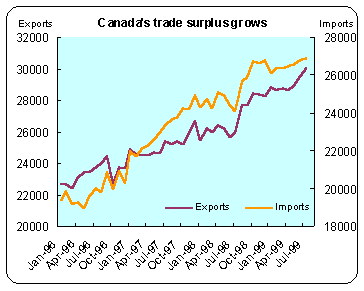 The July international merchandise trade surplus increased to C$3.174 billion, up from a revised June surplus of C$2.745 billion as export growth outpaced import growth. July exports rose 1.8 percent compared with June while imports rose 0.3 percent. The trade surplus with the United States rose to C$5.429 billion in July from a revised C$4.968 billion in June. Canada posted a July deficit of C$211 million with Japan after a C$62 million deficit the previous month.
World Equity Markets
Europe 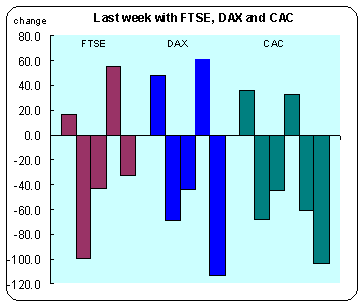
Japan 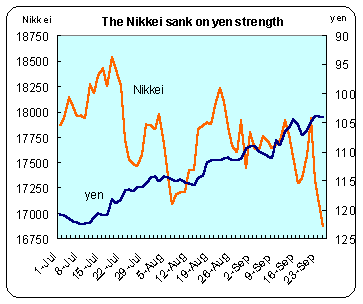
Currencies
Euro 
Why U.S. investors care...
The following indicators will be released this week.
Release dates are subject to change. |
|||||||||||||||||||||||||||||||||||||||||||||||||||||||||||||||||||||||||||||||||||||||||||||||||||||||||||||||||||||||||||||||||||||||||||||||||||||||||